Get in Touch with Us
Contact our compassionate team for inquiries, home healthcare consultations, or to discuss your care needs. We're here to support you and your loved ones.
Contact Us
Frequently Asked Questions
Answers To Commonly Questions
What is home healthcare?
Home Health Care is supportive services provided to individuals, often seniors or those with disabilities, in their own homes to help them maintain independence and improve their quality of life.
How do you ensure the safety and quality of care?
Thorough Hiring and Screening of Caregivers
Background Checks, Drug Screening, Reference Verification, Skills and Personality Assessment, and Licensing and Certifications
Comprehensive Training Programs
Initial Training, Ongoing Education, and Specialized Training
Caregiver-Client Matching
Personalized Matching, Trial Periods, and Cultural and Language Considerations
Supervision and Oversight
Regular Check-Ins, Care Plans, Performance Reviews, and Technology Monitoring.
Client and Family Feedback
Surveys and Reviews, Open Communication Channels, and Complaint Resolution
Safety Protocols and Risk Management
Home Safety Assessments, Emergency Preparedness, and Client Privacy.
Adherence to Regulations and Standards
Licensing and Compliance, Industry Standards, and Insurance and Bonding
Quality Assurance Programs
Accreditation, Internal Audits, and Client Satisfaction Metrics
Technology and Innovation
Care Management Software, robotic care, and camera care options
Can home healthcare services be covered by
insurance?
Home healthcare services can be covered by insurance, but the extent of coverage depends on the type of services (medical vs. non-medical), the insurance provider, and the specific policy.
Who can benefit from home healthcare services?
Seniors: Many older adults prefer to age in place rather than move to assisted living facilities. Non-medical care helps them stay independent while receiving support.
People with Disabilities: Individuals with physical or cognitive disabilities may need help with daily tasks but not necessarily medical care.
Post-Surgery or Injury Recovery: Someone recovering from a procedure might need temporary assistance with daily activities while they regain strength.
Families and Caregivers: Non-medical home health care can provide respite for family members who are primary caregivers, giving them a break while ensuring their loved one is cared for.
Are your caregivers licensed and trained?
Non-medical caregivers are not always required to be licensed, but they are typically trained to ensure they can provide safe and effective care.
Basic Training:
Personal Care, Hygiene and Infection Control, Communication Skills, Companionship, and Household Tasks.
Specialized Training:
Dementia or Alzheimer’s Care, Mobility Assistance, and End-of-Life Care
Ongoing Training:
Workshops, Cultural sensitivity, and Annual refresher courses
What You Can Do as a Client or Family Member?
Research Providers
Monitor Care
Ask Questions
Review Contracts
